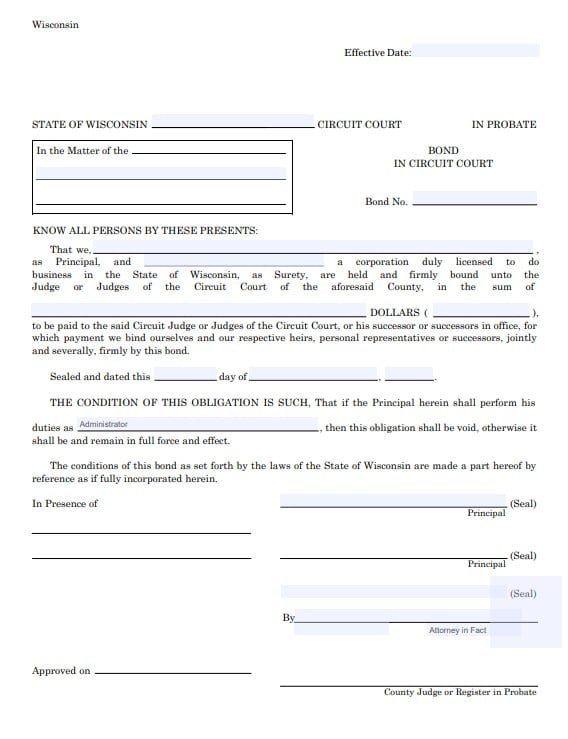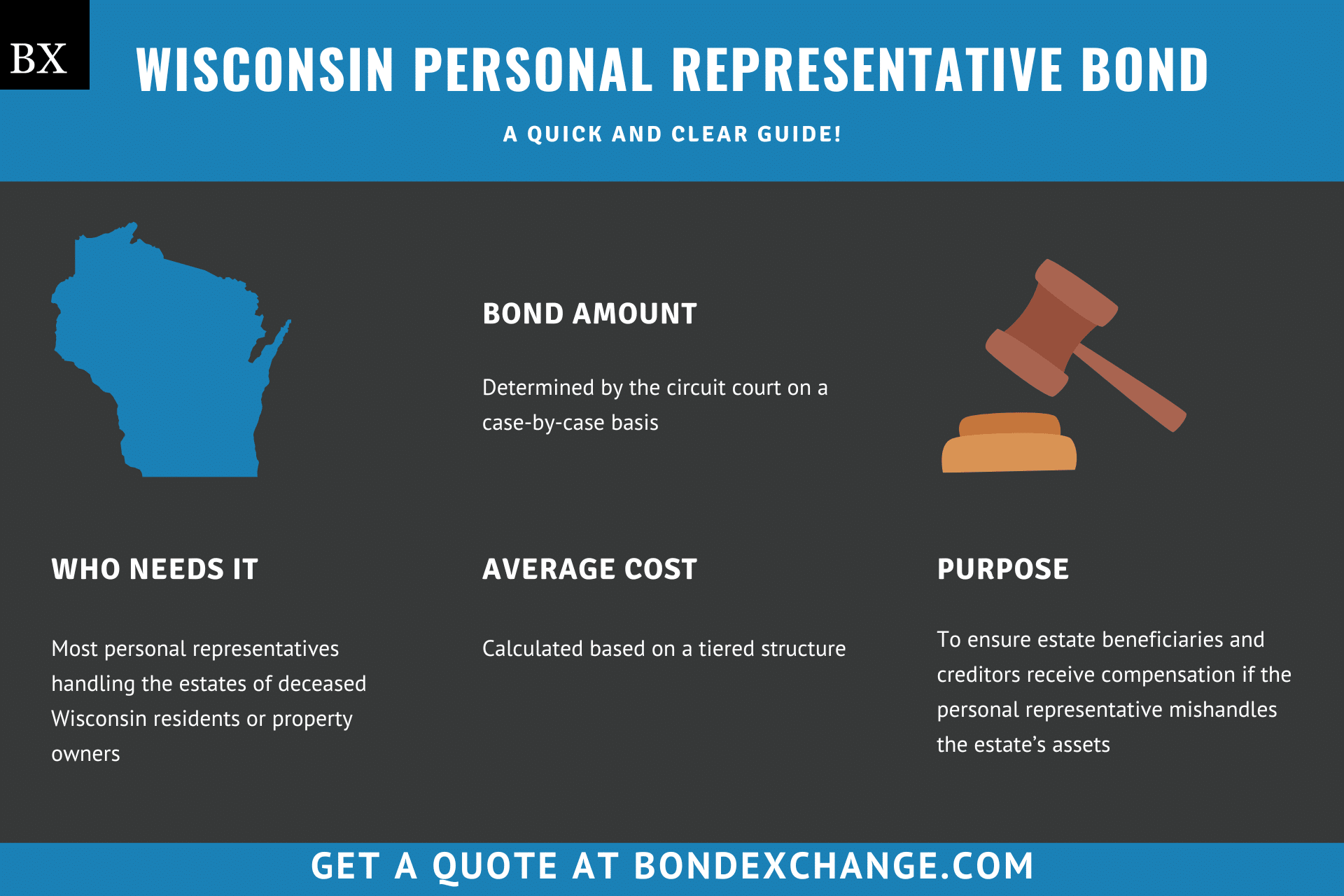Wisconsin Personal Representative Bond: A Comprehensive Guide
This guide provides information for insurance agents to help their customers obtain a Wisconsin Personal Representative bond.
At a Glance:
- Average Cost: Calculated based on a tiered structure
- Bond Amount: Determined on a case-by-case basis (more on this later)
- Who Needs it: Most personal representatives handling the estates of deceased Wisconsin residents or property owners
- Purpose: To ensure estate beneficiaries and creditors receive compensation if the personal representative mishandles the estate’s assets
- Who Regulates Personal Representatives in West Virginia: The county court with jurisdiction over where the deceased individual resided or had property

Background
Wisconsin Statute 856.09 requires all personal representatives of an estate to be appointed by a circuit court before assuming their fiduciary duties. The Wisconsin legislature enacted the appointment requirement to ensure that personal representatives do not mismanage the estate’s assets. To provide financial security for the enforcement of this requirement, the court may require a personal representative to purchase a probate surety bond to be eligible for appointment.
What is the Purpose of the Wisconsin Personal Representative Bond?
Wisconsin requires personal representatives to purchase a surety bond as a prerequisite to being appointed as a fiduciary over an estate’s assets. The bond ensures that the estate’s beneficiaries and creditors will receive compensation for financial harm if the personal representative fails to abide by the regulations outlined in Wisconsin Statute 856.25. Specifically, the bond protects beneficiaries and creditors if the personal representative fails to adhere to all court orders or mismanages the estate’s assets. In short, the bond is a type of insurance that protects the estate’s beneficiaries and creditors if the personal representative violates their fiduciary duties.
How Can an Insurance Agent Obtain a Wisconsin Surety Bond?
BondExchange makes obtaining a Wisconsin Personal Representative bond easy. Simply login to your account and use our keyword search to find the “Probate” bond in our database. Don’t have a login? Gain access now and let us help you satisfy your customers’ needs. Our friendly underwriting staff is available by phone (800) 438-1162, email or chat from 7:30 AM to 7:00 PM EST to assist you.
At BondExchange, our 40 years of experience, leading technology, and access to markets ensures that we have the knowledge and resources to provide your clients with fast and friendly service whether obtaining quotes or issuing bonds.
Not an agent? Then let us pair you with one!

Click the above image to find a BX Agent near you
How is the Bond Amount Determined?
Wisconsin Statute 856.25 grants the circuit court the authority to determine the required bond amount on a case-by-case basis. When determining the bond amount, the court will consider the estate’s total value.
What are the Underwriting Requirements for the Wisconsin Personal Representative Bond?
Most surety companies will examine the following factors when determining eligibility for the Wisconsin Personal Representative bond:
- Personal representative’s credit history (not considered for bonds with limits less than $25,000)
- Whether or not the estate has an attorney (not considered for bonds with limits less than $25,000)
- How long the fiduciary appointment is for
- Whether or not the personal representative is replacing a prior fiduciary
- If the personal representative has ever committed a felony
- If there are disputes among the estate’s beneficiaries
- Whether or not there is any ongoing business in the estate
- If the bond is being required by a creditor
How Much Does the Wisconsin Personal Representative Bond Cost?
Surety companies typically determine the premium rate for personal representative bonds based on a tiered structure. As a result, larger bond amounts will be charged a lower premium rate than smaller bonds.
The following table illustrates the pricing structure for the Wisconsin Personal Representative bond:
$1,500,000 Personal Representative Bond Cost
| Bond Amount | Premium Rate | Total Bond Cost |
|---|---|---|
| First $20,000 | 0.75% | $150 |
| Next $40,000 | 0.60% | $240 |
| Next $140,000 | 0.50% | $700 |
| Next $300,000 | 0.375% | $1,125 |
| Next $1,000,000 | 0.25% | $2,500 |
| Total cost of $4,715 |
Who is Required to Purchase the Bond?
Wisconsin Statute 856.25 states that the circuit court may choose whether or not to require a personal representative to obtain a bond on a case-by-case. However, a bond will be required in most cases. No bond shall be required of any trust company bank, state bank, or national banking association acting as a personal representative.
To paraphrase Wisconsin Statute 851.23, a personal representative is a court-appointed fiduciary responsible for administering a deceased individual’s estate.

BondExchange now offers monthly pay-as-you-go subscriptions for surety bonds. Your customers are able to purchase their bonds on a monthly basis and cancel them anytime. Learn more here.
How do Personal Representatives Become Appointed in Wisconsin?
Personal representatives in Wisconsin must navigate several steps to become court-appointed fiduciaries. Below are the general guidelines, but applicants should refer to Wisconsin’s personal representative guide for details on the process.
Step 1 – Meet the Qualifications
Persons are ineligible for appointment as a personal representative if they are:
-
- Under 18 years old
- Of unsound mind
- A corporation that is not authorized to act as a fiduciary
- A non-resident that has not appointed a resident agent to accept service of process, or
- Considered unsuitable by the court
Step 2 – Determine the Estate Administration Type
-
- Formal: The court directly supervises the probate process. This estate administration type is required if the will prohibits informal administration, if all interested persons do not consent to informal administration and the appointment of the same personal representative, or if an interested person requests formal administration.
- Informal: The court exercises limited supervision over the probate process
- Summary Settlement: Available for estates with assets of less than $50,000 when the deceased has a surviving spouse or minor children, or if the value of the estate does not exceed certain costs, expenses, allowances, and claims.
- Summary Assignment: Available for estates with assets of less than $50,000 that cannot be settled through summary settlement
- Transfer Affidavit: Allows the transfer of the deceased individual’s assets without any court supervision. This estate administration type is only allowed for estates worth less than $50,000 in select circumstances.
Step 3 – Hire an Attorney
Although only required for formal administration, it is highly recommended that personal representatives hire an attorney to assist with the probate process.
Step 4 – Contact the Circuit Court
Personal representatives must contact the circuit court with jurisdiction over the estate to obtain their appointment. A court official will provide the personal representative with all required forms that must be completed and returned. The court will then schedule a hearing where the estate will be opened and the personal representative appointed.
Step 5 – Purchase a Surety Bond
Most personal representatives must purchase a surety bond in an amount set by the circuit court.
How do Wisconsin Personal Representatives File Their Bonds?
Personal representatives should submit their completed bond forms, including the power of attorney, to the probate court with jurisdiction over the estate.
The surety bond requires signatures from both the surety company that issues the bond and the personal representative. The surety company should include the following information on the bond form:
- Court where the bond is to be filed
- Legal name of the entity/individual(s) buying the bond
- Surety company’s name
- Bond amount
- Date the bond is signed
What can Wisconsin Personal Representatives do to Avoid Claims Made Against Their Bonds?
To avoid claims against their bonds, personal representatives in Wisconsin must ensure that they:
- Perform all of their fiduciary duties
- Obey all court orders
- Do not mismanage the estate’s assets
